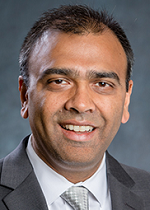AI And Blockchain Will Take Center Stage At DIA 2019

A Q&A with Sudip Parikh, PhD, senior VP and managing director, DIA Americas
New technologies continue to make their way into clinical trials, promising to disrupt the industry by bringing new capabilities and efficiencies to the clinical landscape. Two of those technologies are AI (artificial intelligence) and blockchain, and both will be featured prominently at the 2019 DIA Annual Meeting, taking place June 23 to 27 in San Diego.
Clinical Leader spoke to Sudip Parikh, senior VP and managing director, DIA Americas, to discuss the 2019 event, the keynote speaker, technology sessions, real-world evidence, and patient centricity. In this Q&A, Parikh highlights some of the themes of the 2019 meeting and sessions that attendees will not want to miss.
This year’s keynote speaker is Dr. Gary Gibbons, director at the National Heart, Lung, and Blood Institute (NHLBI) at the National Institutes of Health. What can attendees expect to learn from Dr. Gibbons?
 Sudip Parikh, DIA: Dr. Gibbons is an extraordinary leader and the driving force behind NHLBI’s $3.5 billion investment in biomedical research leading to new therapies and cures. He will dig into recent therapeutic advances for cystic fibrosis and sickle cell disease and talk about how turning discovery science into therapies that improve patients’ lives requires an ecosystem including federal research investment, university science, market capital, and industry know how. He will also discuss how we must all work in concert to take advantage of the opportunities and overcome the challenges that lie ahead with promising technologies in vascular biology, gene editing, and other exciting new fields.
Sudip Parikh, DIA: Dr. Gibbons is an extraordinary leader and the driving force behind NHLBI’s $3.5 billion investment in biomedical research leading to new therapies and cures. He will dig into recent therapeutic advances for cystic fibrosis and sickle cell disease and talk about how turning discovery science into therapies that improve patients’ lives requires an ecosystem including federal research investment, university science, market capital, and industry know how. He will also discuss how we must all work in concert to take advantage of the opportunities and overcome the challenges that lie ahead with promising technologies in vascular biology, gene editing, and other exciting new fields.
Technology, including blockchain and AI, seems to have a central role in many of the sessions this year. What impact do you think these technologies will have on clinical trials?
Parikh: Over the past few of years, we’ve seen blockchain and AI make their way from esoteric fields to super-hyped buzzwords, sometimes losing all real meaning in the popular press. The fact is these are extremely powerful yet sometimes raw technologies when applied in healthcare. The potential is huge, but so is the hype. The possibilities of better patient recruitment, safer supply chains, and better signal detection are in front of us today – with more around the corner. At DIA 2019, we will work hard to serve as a crucible in which the hope can be separated from the hype around these technologies. One specific set of sessions will discuss a study DIA led looking at AI use throughout the drug development continuum. The study identified the areas where AI is most mature and investment is being made.
Real-world evidence (RWE) is another topic that pops up throughout the agenda. Are companies making greater use of RWE, and are we seeing improved trials and patient outcomes as a result?
Parikh: RWE is an area where almost everyone sees the potential — and the challenges. I industry and regulators have reached an inflection point where the conversation is no longer about “should we use RWE,” but rather “how we will use RWE.” We have seen label expansion using RWE and some very preliminary regulatory applications, but the textbook remains to be written on how to use RWE in the regulatory process. With the discussions among industry, regulators, and academics at DIA 2019, it is my hope that we at least write the first few pages of that textbook.
The DIA Annual Meeting is one place where attendees can be assured of hearing the latest perspectives on efforts to make trials more patient-centric. How are these efforts helping to transform trials and patient recruitment?
Parikh: Patient input is critical to successful clinical trials. Their feedback from design to completion can lead to better recruitment and retention in trials. Perhaps even more importantly, patients are informing the endpoints to be measured in clinical trials — giving the product development ecosystem the right things to measure to make patients’ lives better. Isn’t that the why we all got into research, development, regulation, and healthcare in the first place?
Your DIAmond Sessions — featuring open conversations on controversial topics — are always very popular with attendees. Who are some of the speakers that attendees can look forward to hearing from this year?
Parikh: Our DIAmond Sessions are a chance to look at big issues with key leaders. The first DIAmond session is during the opening plenary and will feature a conversation around health data ownership. Who owns healthcare data and who should benefit from its use to discover new and valuable therapies? Dr. Gibbons, our keynote, will participate, as will Harlan Krumholz from Yale University, Doug Peddicord from the Association of Clinical Research Organizations, Deven McGraw from Ciitizen, and Donna Cryer from the People-Centered Research Foundation. Craig Lipset, who recently led Clinical Innovation at Pfizer, will moderate. On Thursday, I’m happy to be joined by Dr. Patrizia Cavazzoni, Dr. Christopher Joneckis, and Dr. Tamy Kim for the FDA Town Hall session, where we’ll be discussing updates from FDA leadership on regulatory issues and a few other hot-topic issues impacting the industry. The final DIAmond session is incredibly unique in the sense that it brings together experts from the FDA and EMA to discuss collaboration. That’s hosted by Dr. Sandra Kweder and Tânia Teixeira, and it’s a topic that is critical in this global ecosystem.
6. Are there any other topics you’re excited to see take center stage at this year’s meeting?
Parikh: While there are certainly many great topics at this year’s meeting, I’m most excited about the conversations surrounding data and technology — and how AI and blockchain fit into that realm. I’m enjoying the conversations happening right now around drug pricing and biosimilars, the intersection of government and industry all around the world, and the impact of legislation on regulatory agencies. But if I had to home in on a few sessions I’m keeping on my radar, they would be:
- The Soapbox Sessions on the ethics of gene editing (#131) and the ownership of health data (#378) by the CEO of LunaDNA, a San Diego startup
- The Evolving Gene Therapy Regulatory Framework: A Brave New World, featuring Dr. Peter Marks from FDA (#341)
- Using Conjoint Analysis and Slated Preferences in Drug Development and Regulatory Decision-Making (#42)
- Machine Learning in Pharmacovigilance (#30)
- Patient Focus as Part of the Regulatory Affairs or DNA (#208)
- Real-World Data to Real-World Evidence (#218)
